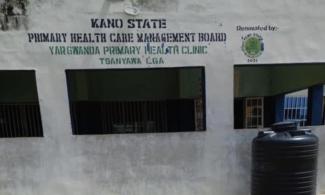
Once a place filled with laughter and warmth, now enveloped in a chilling silence reminiscent of a desolate graveyard. The haunting tragedy of Hafsat Umar's untimely demise during her fifth pregnancy, a victim of the glaring absence of proper maternal care, has plunged her four children into a lifelong abyss of inconsolable grief. Left to navigate a world devoid of their mother's nurturing presence, they grapple with an immeasurable void that refuses to be filled.
Despite billions of naira in funding, the Kano State Health Trust Fund has failed to improve maternal healthcare in the state, leaving women to die from preventable causes. In this report, Abdulwaheed Sofiullahi writes on the shocking truth about the Fund's mismanagement and lack of transparency.
Once a place filled with laughter and warmth, now enveloped in a chilling silence reminiscent of a desolate graveyard. The haunting tragedy of Hafsat Umar's untimely demise during her fifth pregnancy, a victim of the glaring absence of proper maternal care, has plunged her four children into a lifelong abyss of inconsolable grief. Left to navigate a world devoid of their mother's nurturing presence, they grapple with an immeasurable void that refuses to be filled.
Hafsat's demise was a result of the immense stress she endured during her period of pregnancy whilst getting care at the under-equipped Primary Healthcare Center (PHC) in Hugungumai Community, Kunchi LGA, Kano State. The facility's services proved inadequate for her critical needs, lacking even the most basic provisions, let alone a functional maternity ward.
The weight of his wife's premature departure in the year 2021 has become an unbearable burden for Abdulsalam Umaru, who grapples with the memory of her arduous 324-kilometer journey to a distant general hospital in search of adequate prenatal care.
Despite billions of naira in funding, the Kano State Health Trust Fund has failed to improve maternal healthcare in the state, leaving women to die from preventable causes. In this report, Abdulwaheed Sofiullahi writes on the shocking truth about the Fund's mismanagement and lack of transparency.
Once a place filled with laughter and warmth, now enveloped in a chilling silence reminiscent of a desolate graveyard. The haunting tragedy of Hafsat Umar's untimely demise during her fifth pregnancy, a victim of the glaring absence of proper maternal care, has plunged her four children into a lifelong abyss of inconsolable grief. Left to navigate a world devoid of their mother's nurturing presence, they grapple with an immeasurable void that refuses to be filled.
Hafsat's demise was a result of the immense stress she endured during her period of pregnancy whilst getting care at the under-equipped Primary Healthcare Center (PHC) in Hugungumai Community, Kunchi LGA, Kano State. The facility's services proved inadequate for her critical needs, lacking even the most basic provisions, let alone a functional maternity ward.
The weight of his wife's premature departure in the year 2021 has become an unbearable burden for Abdulsalam Umaru, who grapples with the memory of her arduous 324-kilometer journey to a distant general hospital in search of adequate prenatal care.
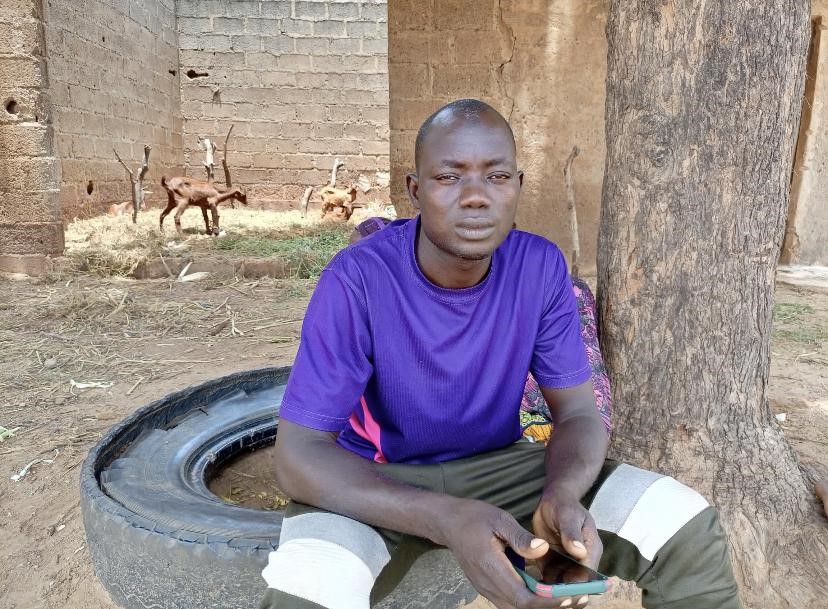
"I still can't believe it. In 2021, my wife's life was cut short by the difficult journey she had to endure for antenatal care in a faraway hospital in town. Our local PHC had forsaken her on that fateful night when she wanted to deliver due to its lack of essential maternity equipment and its deplorable state, devoid of even basic medical supplies. She and our unborn child never made it to town; their lives were claimed by this dire situation," Umaru said.
Hafsat Umar's tragic fate was not an isolated incident in Hugungumai community. Another expectant mother, Mrs. Aisha Saleh, met a similarly grim end, victimized by the woeful inadequacy of the primary healthcare system. The anguished narrative of her mother, Mrs. Nafisa, reflects the systemic failures that continue to plague countless lives across rural communities in Kano.
On February 15, 2023, Mrs. Nafisa rushed her daughter Aisha Saleh to a traditional birth attendant in the Shuwaki community because the Primary Healthcare Center lacked adequate maternal care facilities.
"After the traditional attendant facilitated the delivery, Aisha's condition swiftly deteriorated, with uncontrollable hemorrhaging leading to a catastrophic loss of blood. That very night, we were compelled to rush her from Kano to Kazaure General Hospital in Jigawa State," recounted the 52-year-old Nafisa, her voice trembling with the weight of sorrow and indignation.
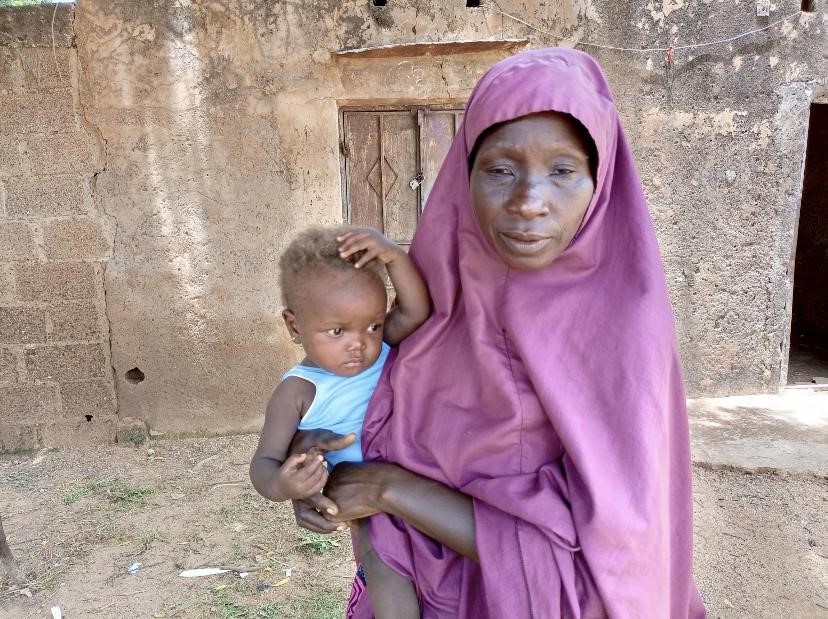
She added that: “After her admission, she received three pints of blood. We returned home, but a day later, she felt ill and we rushed her to Kazaure Hospital. The doctors recommended additional blood transfusions, and with the selfless contribution of her brothers, she received three more pints of blood, bringing the total to six. For 10 agonizing days, she struggled to pass urine.
“Subsequently, we were referred to Mallam Aminu Kano Teaching Hospital, where, in the span of five weeks, she underwent an astonishing twelve or more blood transfusions. Following her discharge, her health continued to deteriorate, necessitating further blood transfusions at Bichi General Hospital. Tragically, Aisha succumbed to her ordeal on the fourth day of her admission, enduring immeasurable suffering during and after her ill-fated pregnancy.”
A 2008 report highlighted Nigeria's significant contribution of 14% to global maternal deaths, a haunting statistic that continues to cast a shadow over the nation. The 2022 UNICEF report amplifies this distress, revealing a staggering 576 maternal deaths per 100,000 live births and an alarming annual toll of approximately 262,000 infant deaths
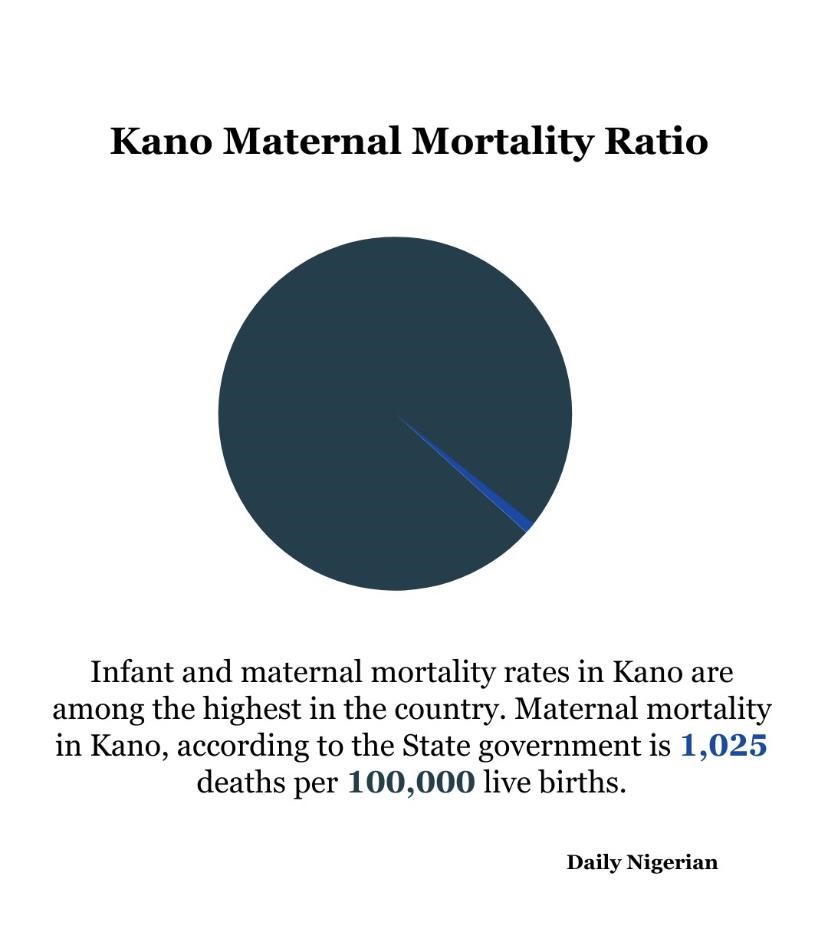
Kano's Health Trust Fund: A mirage of unfulfilled promises
Earmarked as a beacon of hope for the ailing healthcare system in Kano, the State Health Trust Fund was envisioned in 2017 with the aim of facilitating the collection, management and distribution of vital funds and resources to bolster the state's public health institution and primary healthcare facilities.
Enshrined within the Kano State Health Trust Fund Law, the legislation mandated the allocation of five percent (5%) of the monthly internally generated revenue (IGR) of the State Government to the Trust Fund, signifying a resolute commitment to improving maternal healthcare services.
Under the fund's comprehensive sharing formula, section five (on page 2) of the legislation emphasized that the designated 5% of the IGR was specifically dedicated to bolstering the maternal program, with regular remittances directed to the Committee on Maternal Program each month. Additional revenue streams, including a percentage of statutory allocations to Local Government Councils, corporate and individual contributions, endowments, grants, and subventions, were intended to fortify the resources at the Trust Fund's disposal.
However, a stark discrepancy has emerged between the lofty aims of the Kano State Health Trust Fund and its practical implementation. Recent revelations from the Kano State 2022 budget performance, specifically on page 12, shed light on disquieting irregularities. The report indicated that a total of N380 million and N440.56 million were released to the Trust Fund in 2020 from the state's IGR and statutory deductions from the Local Government Councils, respectively.
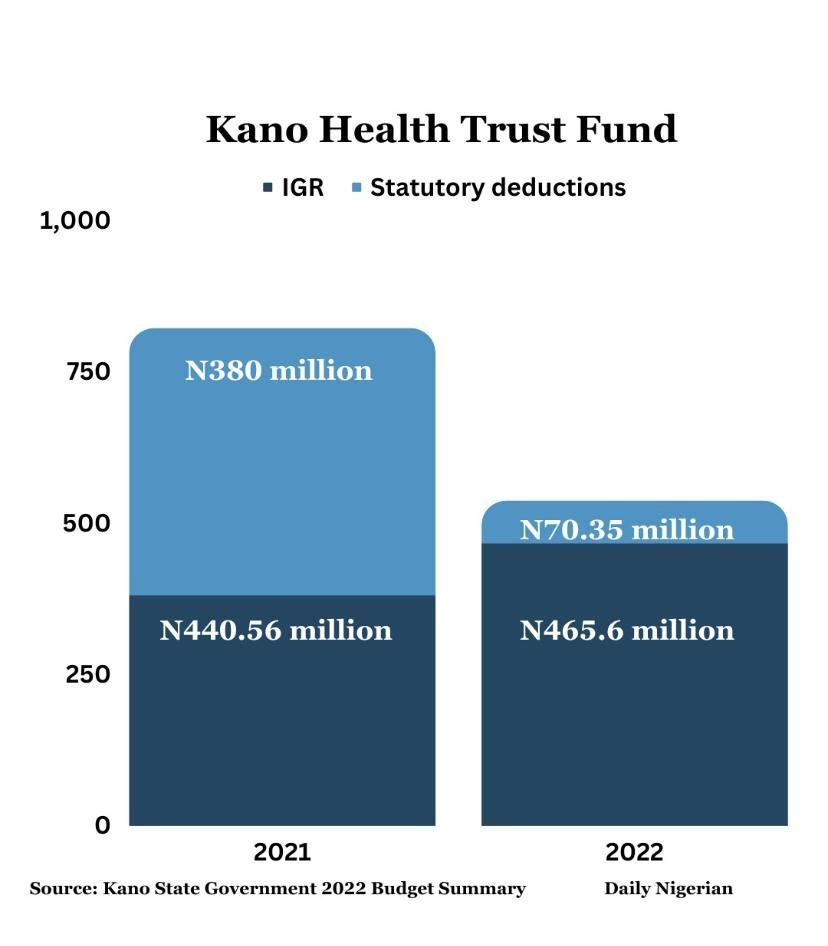
Alarming figures from official documentation in August 2021 further deepened the concern. Out of the budgeted amounts of N1.2 billion from the IGR and N1.4 billion from the statutory deductions of the Local Government Councils, only N465.6 million and N70.35 million were made available to the Kano Health Trust Fund, leaving a substantial portion of the allocated funds inaccessible.
Several sources in the state, including a non-profit organization advocating for enhanced healthcare access in rural areas of Kano have raised compelling apprehensions regarding the government's stewardship of these crucial funds.
Sources allege that the previous administration of Governor Gaduje failed to establish the committee on maternal health as mandated by law despite substantial financial allocations. No tangible projects or initiatives related to maternal care have been implemented.
In a bid to address these concerns, a copy of a letter written by a non-profit organization who pleaded anonymity for safety concerns to the state government seeking transparency and accountability in the utilization of the Trust Fund’s resources was obtained by this reporter. The letter which was greeted with silence from the authorities has intensified calls for urgent corrective measures to ensure the effective implementation of the Kano State Health Trust Fund’s objectives.
Kano state health officials evasive, lack transparency
In accordance with the Freedom of Information Act 2011, Daily Nigerian filed a Freedom of Information (FOI) request with the Kano State Ministry of Health on September 13, 2023, seeking details of projects, financial allocations, and disbursements of funds collected by the Trust Fund from 2020 to 2022. The law stipulates a response deadline of seven working days, but the Ministry remained silent despite acknowledging receipt of the request.
Daily Nigerian then reached out to Dr. Kabiru Ibrahim Getso, the former Commissioner of Health, on October 2, 2023, for insights into the dire circumstances faced by pregnant women in Kano despite the establishment of the state's healthcare trust funds. However, Dr. Getso did not respond to text messages or calls.
On the same date, Daily Nigerian also contacted the current Commissioner of Health, Dr. Abubakar Labaran Yusuf via SMS and WhatsApp to seek information on the state's mortality crisis and the utilization of allocated funds. However, the Commissioner also remained unresponsive.
The Ministry's Public Relations Officer, Mr. Ibrahim Abdullahi, also refused to cooperate with this newspaper’s investigation. When the reporter reached out to him on September 25, 2023, to request audience and the contact information for the Ministry's Permanent Secretary, Mr. Abdullahi demanded information about the nature of the investigation. He then claimed that he would only provide the contact information if the Permanent Secretary agreed. When the reporter followed up on September 27, Mr. Abdullahi said that the Permanent Secretary wanted to know more about the projects being investigated before agreeing to an interview.
Subsequently, on October 4, 2023 this reporter requested the contact information for Dr. Fatima Zahradeen, Executive Secretary of the Kano State Health Trust Fund from the health ministry’s spokesperson. Mr. Abdullahi initially seemed cooperative, but after sharing the scope of the inquiry, as detailed in the FOI request to the Ministry of Health, he inexplicably ceased responding and blocked the reporter's contact on WhatsApp.
More women die due to lack of maternal mortality care
Kabiru Alhassan, 45, lost his third wife, Safiya, and their unborn child on the night of May 12, 2022. He had to ride his motorcycle for 15 kilometers to the nearest health center, but his bike developed faults on the way. Safiya died before they could reach the hospital.
Ummi Haliru, 68, resident of Farsa village in Tsanyawa LGA, Kano, shares a heart-wrenching story about her daughter Hasiya Abubakar's journey.
Hasiya got married at 21-year-old and soon became pregnant while her husband was away in Lagos for business. Mrs Haliru diligently took her daughter for antenatal care at Yargwanda PHC, which was 10 kilometers away. As her condition worsened around six months into her pregnancy, they sought help at Bichi Hospital. Eventually, they had to travel to Gidan Mutum Daya General Hospital in Katsina State. Tragically, Hasiya passed away during childbirth in October 2022, as there were no doctors available at their local PHC, leaving Ummi devastated by the poor healthcare in their community.
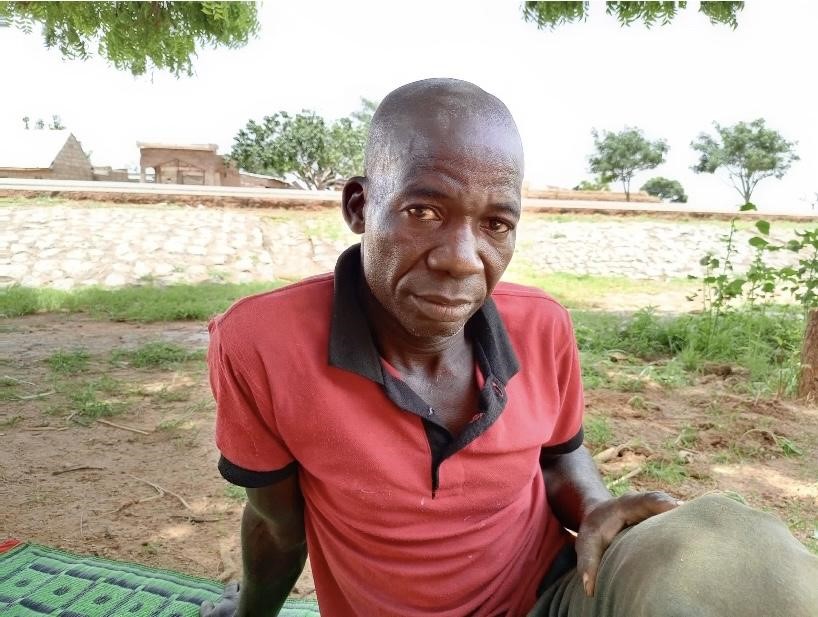
Dr. Fatima Musa, a public health expert in Kano State, says the number of mothers dying during childbirth is alarmingly high. She calls for more funding of clinics and healthcare centers in remote areas, as well as education about prenatal care, family planning, and safe childbirth.
Rural health officials react
Abdulmajeed Abdullahi, who is in charge of Hugungumai Primary Healthcare in Kunchi, expressed deep concerns about the dire state of his PHC. He said that the government is not providing any medical assistance, not even basic supplies like paracetamol for maternal health.
Abdullahi said that pregnant women from Hugungumai village often face a challenging choice: either undertake a 30km journey to Bichi LGA or travel to Katsina or Kazaure in Jigawa state for maternity care.
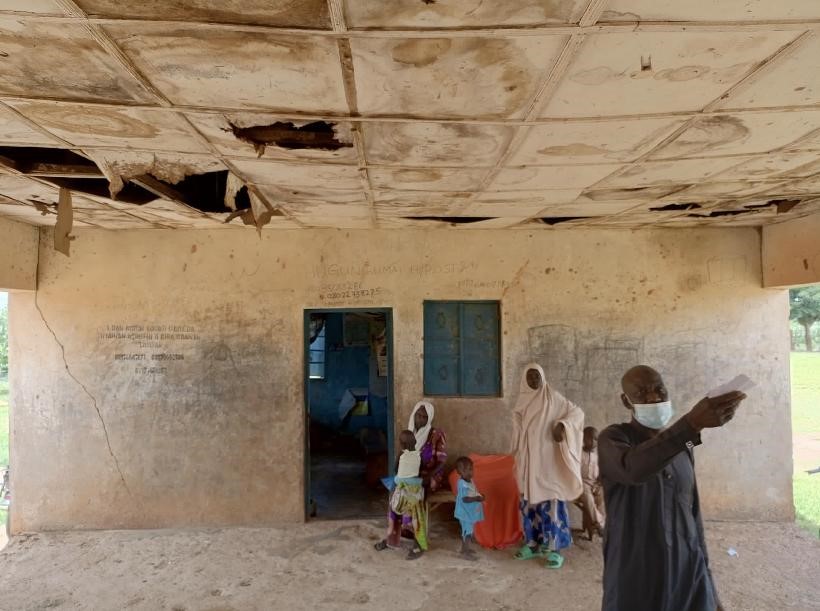
He explained that the absence of maternity services at their PHC means that most expectant mothers give birth at home with the help of traditional birth attendants. This lack of healthcare services is contributing to maternal deaths.
Abdullahi added that he is the sole health worker at the PHC, and they do not provide antenatal care. This is why many women avoid visiting unless their children have minor illnesses like malaria. Even the medications must be purchased by the patients; there is nothing free at Hugungumai PHC.
In an interview with Dr. Inusa Mukthar, who oversees Yargwanda Primary Healthcare Center, he detailed the facilities available. He said that the facility offers comprehensive health services, including a maternity ward that operates round the clock.
Mukthar said that they offer free antenatal care, immunizations, and other services, while some treatments are paid. For example, laboratory tests for malaria, blood groups, HIV, and HPV are provided free of charge.
Mukthar acknowledged that although there are minimal cases of maternal mortality at their PHC, challenges persist in Tsanyawa LGA. These include religious beliefs, where some husbands consider it taboo for a male doctor to oversee their wives' delivery. To address this, they have built a separate ward primarily managed by female staff for maternity cases.
Mukthar elaborated that other obstacles contributing to maternal deaths are the difficulties faced by those in hard-to-reach areas who struggle to access primary healthcare or general hospitals due to poor roads and distance. He said that providing a vehicle to transport pregnant women to the hospital could significantly reduce maternal mortality. He added that he has witnessed cases where women lost their lives on the way or due to a lack of blood for transfusion.
“Why it is difficult to address maternal mortality in Kano” - Expert
Ibrahim Garba Maryam, the Executive Manager of Gender and Social Inclusive at the Kano Civil Society Forum, expressed concerns about the allocation of funds to address maternal mortality in Kano State. He revealed that while the Kano State House of Assembly passed a law dedicating ten percent of the internally generated revenue (IGR) to the program, the Kano State Health Trust Fund has failed to implement this law. Furthermore, there is a committee responsible for overseeing the program, but attempts to contact them have been futile.
Mr. Garba Maryam highlighted the critical issue of the committee's members, stating, "The problem is, who are the committee members? If we can identify them, then we can inquire about how they manage the funds. Without this committee, we won't have access to how the allocated funds were used."
He went on to explain that, besides the Kano State Health Trust Fund, there are other funds such as Basic Healthcare Provision Funds designated for maternal mortality and nutrition. However, these funds were inaccessible during the previous government's administration, and accessing them remains challenging in the current government. Even when they use the Freedom of Information (FOI) request, the details of how the monies are utilized is not made available.
Mr. Garba Maryam expressed his frustration, saying, "It's difficult to address maternal mortality in Kano because none of the local governments submit budget reports. Both the Kano State Health Trust Fund and Basic Healthcare Provision Fund are required by the Federal Government to remit one percent of their allocation to the committee on maternal mortality projects but they claim to have released N850 million to the local governments."